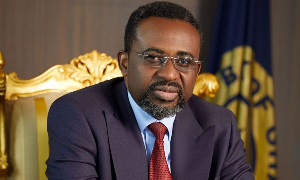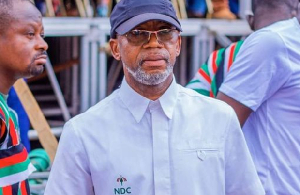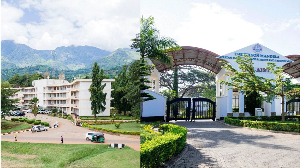. He finally appoints an 'Administrator-General' to vet and monitor projects.
Franklin Cudjoe
It seems the President is beginning to listen. IMANI had for the past three years urged the government to appoint someone who will monitor and assess all government projects to avoid the excruciating failure associated with the $10bn Korean STX housing, the $3bn Chinese Development Bank ,CDB loan and $6bn Kampac railway projects. The President today has appointed a lady Lawyer to do just that. We can quibble over the lateness in adopting this simple task and also over her competence but she can do it when guided and supported. The President says in part " In her new role, Dr. Sawyerr, a lawyer by profession, will be responsible for tracking the execution of all Government policies, projects and programmes and ensure the fulfilment of the President's social contract with the people of Ghana."
This is one of five tasks I personally reminded the President to undertake upon assumption of office. It was even published in the African Report and recently in IMANI's 2014 public sector leadership rankings, we urged him to do this when we rated his former Chief of Staff as the worst public sector leader a month before he fired him. The other four tasks apart from the first need detailed attention.
Five tasks for Ghana's incoming president
Posted on Thursday, 06 December 2012 10:43
http://www.theafricareport.com/Elections/five-tasks-for-ghanas-incoming-president.html
Risk Analysis on all Government Projects
The presidency should not become the strategic hub for policy planning from a financial and technical point of view. Political accountability resides in the executive, and that is enough. We concede that for most strategic projects the requisite expertise may be spread across multiple ministries, departments and agencies. The Cabinet Office can be strengthened and given powers that allow it to coordinate expertise across the civil service. We have centres of expertise that could be asked to help government create a kind of 'administrator general' role in the cabinet to vet all proposed projects. It goes without saying that such a move can only succeed if it follows a strengthening of the Cabinet Office to ensure coordination across the technical, financial and political accountability functions of the executive.
Reform the Pension Sector
Potentially, income from pension contributions is more sustainable than oil. For as long as people continue to work, there will continue to be pension contributions. Scheme trustees can invest funds in the private sector, real estate, listed equities and government treasuries. Pension sector reforms planned three-and-a-half years ago are only now being implemented. But there are serious questions to be asked about the operations of the Social Security and National Insurance Trust (SSNIT), which seems to have become a cash cow for politicians. SSNIT has invested in loss-making government enterprises and has very shady reporting methods that can only be responsible for the teeming number of public sector workers who retire on $35 a month after contributing to the scheme for 30 years.
Determine an optimal level of taxation
What level of public spending is desirable for a developing country such as Ghana? Should the government spend one-tenth, one-third or half of the national income? The size of government expenditure is naturally associated with the ideal level ?of tax revenue. Taxes are a necessary evil, but a generally accepted view is that they should not be a disincentive for profitable economic activity. In Ghana, however, a lot of industry captains and the labour force complain about the tax rates. The perception in the formal sector is that it bears too much of the tax burden to achieve the government's revenue targets.
?Avoid wasteful projects
Even though we all applauded the decision to go biometric in this election, every objective observer knew we have already collected biometric details of citizens for the following purposes: national passports, the e-Zwich payments platform and the national identification system. It has been proposed that we do the same for voters' ID cards, drivers' licences and National Health Insurance Scheme (NHIS) cards. A harmonised system means you may even be able to use one card for multiple systems. Even ignoring the inconveniences and inefficiencies, the monetary costs of deploying parallel infrastructure is no small matter. Let us assume the cost of the Electoral Commission system is the benchmark. A crude estimate ?of the total cost is a whopping $400m. We believe we can cut $250m off this figure through harmonisation.
Review the single spine salary structure for the civil service
Government's attempt to quadruple the salaries of public sector workers through the single spine salary scheme has been a drawback to strengthening the private sector as an innovator. The single spine scheme may appear to bring relative peace on the labour front, but for how long? Simply, single spine is a diversionary tactic embraced first by the NPP and implemented by the NDC to sidestep critical issues since the structural adjustment period. The fundamental logic of single spine is crooked. Wage harmonisation in the public sector betrays an arrogance of central planning rarely encountered in our tepid age of policymaking. There is no credible science that can, without descending into farce, establish equivalences between different job roles in different settings.
Franklin Cudjoe is founder and President of IMANI Center for Policy and Education, Africa's second most influential think tank. He is a leading and founding member of OccupyGhana, Ghana's foremost Pressure Group responsible for demanding public sector performance and reform through legal and orderly means.
Opinions of Monday, 23 March 2015
Columnist: Cudjoe, Franklin














